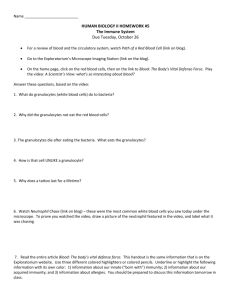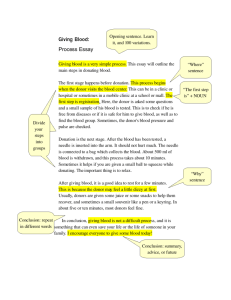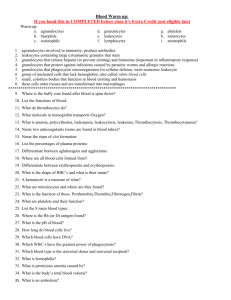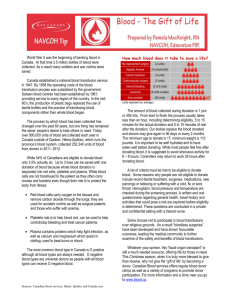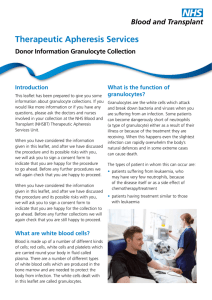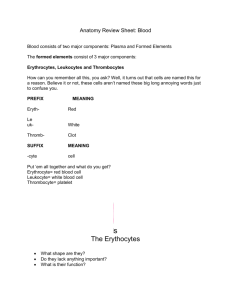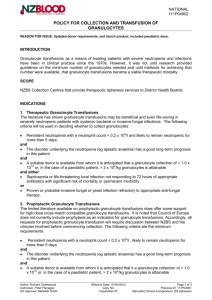granulocyte donor information
advertisement
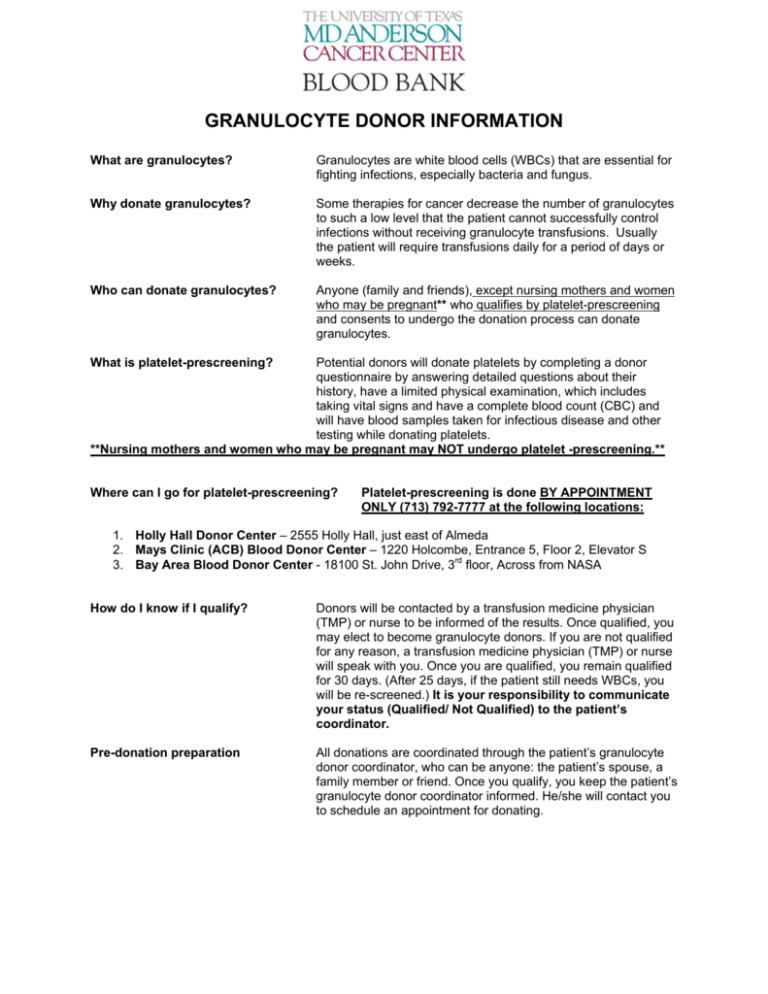
GRANULOCYTE DONOR INFORMATION What are granulocytes? Granulocytes are white blood cells (WBCs) that are essential for fighting infections, especially bacteria and fungus. Why donate granulocytes? Some therapies for cancer decrease the number of granulocytes to such a low level that the patient cannot successfully control infections without receiving granulocyte transfusions. Usually the patient will require transfusions daily for a period of days or weeks. Who can donate granulocytes? Anyone (family and friends), except nursing mothers and women who may be pregnant** who qualifies by platelet-prescreening and consents to undergo the donation process can donate granulocytes. What is platelet-prescreening? Potential donors will donate platelets by completing a donor questionnaire by answering detailed questions about their history, have a limited physical examination, which includes taking vital signs and have a complete blood count (CBC) and will have blood samples taken for infectious disease and other testing while donating platelets. **Nursing mothers and women who may be pregnant may NOT undergo platelet -prescreening.** Where can I go for platelet-prescreening? Platelet-prescreening is done BY APPOINTMENT ONLY (713) 792-7777 at the following locations: 1. Holly Hall Donor Center – 2555 Holly Hall, just east of Almeda 2. Mays Clinic (ACB) Blood Donor Center – 1220 Holcombe, Entrance 5, Floor 2, Elevator S 3. Bay Area Blood Donor Center - 18100 St. John Drive, 3rd floor, Across from NASA How do I know if I qualify? Donors will be contacted by a transfusion medicine physician (TMP) or nurse to be informed of the results. Once qualified, you may elect to become granulocyte donors. If you are not qualified for any reason, a transfusion medicine physician (TMP) or nurse will speak with you. Once you are qualified, you remain qualified for 30 days. (After 25 days, if the patient still needs WBCs, you will be re-screened.) It is your responsibility to communicate your status (Qualified/ Not Qualified) to the patient’s coordinator. Pre-donation preparation All donations are coordinated through the patient’s granulocyte donor coordinator, who can be anyone: the patient’s spouse, a family member or friend. Once you qualify, you keep the patient’s granulocyte donor coordinator informed. He/she will contact you to schedule an appointment for donating. Once you been qualified to donate WBCs, there is an additional Two Day Commitment WEST NILE VIRUS AND PRE-DONATION MEDICATION The day before each actual donation, qualified donors must perform a brief re-screen with a donor tech and a TMP and be tested again for West Nile Virus. This performed only at: Blood Donor Center - Holly Hall 2555 Holly Hall, just east of Almeda 1:00pm – 4:00pm – Monday - Sunday Pre-donation medications will be ordered by the TMP. Doses are ordered specifically for each donor and cannot be shared. • For the first donation, the donor injects Neupogen and takes 2 corticosteroids pills by mouth • For subsequent donations, only Neupogen injection is required These medications must be taken at 8:00 pm for maximum effectiveness. • Donors will receive instructions on performing injections. GRANULOCYTE DONATION Granulocyte collections are scheduled only at: Blood Donor Center - Holly Hall 2555 Holly Hall, just east of Almeda 8:00 am – 7 days a week How are granulocytes collected? Granulocytes are collected by a special machine using a process called apheresis (pronounced ay-fur-ee-sis). On the day of donation, blood is removed by a sterile procedure from one arm, cycled through the instrument that collects only the granulocytes, and then returned through the other arm. It takes between 2 ½ and 3 hours to collect enough granulocytes for one dose for one patient. How long can they be stored? Granulocytes have a very short storage period in the bag, so they must be transfused as soon as possible after collection. **If you are running late or have to cancel your appointment, contact the Blood Donor Center (713) 792-7777 as soon as possible How often can I donate? Form Effective Date:01-05-09 Qualified women (not pregnant or nursing) can donate every other day up to 4 times (1 cycle) Qualified men can donate every other day up to 5 times (1 cycle) Both men and women should wait 2 to 4 weeks before beginning another cycle of donations
